- Home
- Annie Proulx
Bad Dirt Page 7
Bad Dirt Read online
Page 7
Sedley went to Vietnam. Gilbert, who had a growth inside his nose, was 4-F despite his strength and muscle. Sedley was captured by the Vietcong and spent several years in a bamboo cage. He came back a different person, crisscrossed with sudden rages brought on by inconsequential events, such as the rattle of dishes or a truck crossing the bridge. He was thought to be unstable and in need of watchful care. He moved in with May and Jim. May could calm Sedley down when he was having one of his fits. She had always been close to Sedley, had, from the time she was a small child with nightmares, padded down the hall and into his moonless north room, climbed into his bed for warmth and protection. The infant she bore six months after she married Jim Codenhead might have been her brother’s child or, for that matter, Gilbert Wolfscale’s or even Jim Codenhead’s. For years, whenever Gilbert was at their house, he studied the child, Patty, trying to work out whom she resembled. He could come to no conclusion.
Vietnam nightmares tortured Sedley Alwen. Sometimes, to give May a break, Gilbert made the long drive, taking him to Cheyenne to the Veterans Administration hospital, where Sedley saw the shrink and got his prescriptions renewed. It was a two-day trip and they stayed in a motel overnight, sharing a room. After the session Sedley would be talkative and excited. Gilbert listened attentively to his stories of torture and comrades’ deaths. It was at these times Sedley resembled the friend of his childhood, excited and eager, though the subject matter was fearful. But he could not have whiskey. They tried it once and found out. Whiskey made him act up, smashing the motel furniture and howling at the light fixture in the ceiling.
By the end of the century Gilbert was fifty-five and caught in the downward ranching spiral of too much work, not enough money, drought. It kept getting drier and drier, grasshoppers appearing as early as April and promising a plague in August. The grass crackled like eggshells under his feet. There was no color in the landscape, the alkali dust muting sage, grass, stones, the earth itself. When a vehicle passed along the road a fine cloud spread out and slowly settled. The air was baked of scent except for the chalky dust with its faint odor of old cardboard. He was conscious of how many things could go wrong, of how poorly he’d reckoned the ranch’s problems.
To the new-moneyed suitcase ranchers who had moved in all around him—ex-California real estate agents, fabulous doctors, and retired cola executives—the Harp looked a skanky, rundown outfit. They noticed the yard littered with stacks of rusted sheet metal held down by railroad ties, a pile of crooked fence posts inhabited by chipmunks, the long string of log additions to the old house. Some of these rich people, heated with land fever and the thought of a bargain, came to Gilbert and offered to buy his ranch. He could see in their eyes how they planned to bulldoze the house and build mansions with guest cottages. Guest cottages seemed reprehensible to him.
“Them rich pricks are lower than a snake’s ass in a wagon track,” he said to his mother. “I told him, my granddad homesteaded this place and if I ever seen his California butt on my property again I’d shoot it off. I looked him right in the eye and he got the message. He turned color so fast he farted.”
His mother produced her hard little laugh.
It had always been dry country, and no one born there expected more than a foot of annual rainfall in a good year. The drought halved that, and he could see the metamorphosis of grazing land into desert. The country wanted to go to sand dunes and rattlesnakes, wanted to scrape off its human ticks. The shortage of grass and hay forced him to cut back on his cattle. He didn’t have enough hay to feed his own stock. Everything told him that the day of the rancher was fading, but he dodged admitting it. He blamed the government, he blamed Salt Lake City, for the damn Mormons, he said, had seeded the clouds for the Olympics, sucking out all the snow moisture before it reached Wyoming. The ranch house well was eleven hundred feet deep and the water brackish. In the drought years of the 1930s and again in the ’50s, his father had put in earthen dams and stock ponds, and in wet years they had held water but now were silted up and dried and stood as unsightly pits filled with weeds. In the center of one dry hole he piled an immense stack of dry brush, adding more every year, intending to burn it with the first good snow.
He was pestered. Some newcomer wanted a shortcut easement through the ranch to his million-dollar luxury house on the other side. A long-nosed Game & Fish biologist nagged him about fences that blocked antelope passage. Hunters wanted to shoot his deer. A busybody woman straight out of agricultural school came from the Extension Service one day and lectured him about protecting stream banks from cow-hoof erosion, about pasture rotation to prevent overgrazing.
“I heard all that shit. But I’ll tell you what. I let the cows graze where they want and drink where they will. Been doin this for a while. Guess I know somethin about it.” He stood in a truculent posture, legs apart, chin thrust forward. The woman shrugged and left.
Although he now lived a bachelor son’s life, he knew how it was to be married. His wife, Suzzy, had left him in the spring of 1977 to live in Sheridan, sixty miles distant, when the two boys, Monty and Rod, were still young. Those boys were doomed, said Gilbert, smacking his hand on the table for emphasis, to grow up without a father’s guidance and example, injured because they were denied a boy’s life on the ranch.
“If he wants a see the kids why can’t he just come into town?” Suzzy said to her mother on the phone after the split. Her voice rose, clipped and complaining. “You know I put in years on that ranch, and nothin really worked right. Half the time there wasn’t water and when there was water it was nasty. We couldn’t get in or out in the winter. No telephone, no electricity, no neighbors, his mother always naggin, and thework ! He wore me down. ‘Do this, do that,’ bullyin ways. Keep that old house clean? Couldn’t be done. He could a sold the place fifty times over and lived decent if he got a job like a normal human bein, but would he? No. I wouldn’t relive those years for nothin.” Once she had made up her mind to leave, her own stubbornness emerged. But Gilbert refused to agree to a divorce, and the separation and enmity dragged on.
In town she got a cash register job at the Big Boy supermarket, and as soon as the two boys were old enough to run errands and deliver papers she made them get after-school and weekend jobs as well. She was interested in money and showed them there were better things than cows and debt.
The Big Boy job was no good. Not only was the pay low but she disliked having to repeat “Have a nice day” to people who deserved to be ridden bareback by the devil wearing can openers for spurs, and one day she quit to take a job as a filing clerk in the county treasurer’s office. It graveled Gilbert that she handled his property tax and vehicle registration papers.
She wore him down on the divorce, and he gave up after a fight in town in her new house. She had bought an old brick mansion with big trees in the yard and an iron ornamental fence around it. In the 1880s the house had belonged to a Chicago merchant who used it two or three times a year to oversee his ranchinvest ments. Gilbert did not understand how she could afford this house. They had argued, then screamed. Gilbert stood with his legs apart and his arms hanging loose. Another man would have recognized this as a bad sign, but she could not stop blaming him, and he, goaded to violence, slapped her a good one and she came at him and yanked out a clump of his hair in the front where it would show, ran to the back of the house, and called the sheriff. When the law came she accused him of assault, showing the red mark on her cheek as proof.
“What aboutthis ?” shouted Gilbert, pointing to his bleeding scalp, but Sheriff Brant Smich, his second cousin, ignored him. When the divorce finally came through it was settled that if he wanted the boys to help out on the ranch for a weekend he would have to drive in and fetch them and he would have to pay them for their labor. He had paid practically nothing for child support during the long separation, she said, it was the least he could do. He protested, said he had canceled checks to prove he had certainly paid adequate if not luxurious support.
�
�Take it to court,” she said, “you think you been treated so bad.”
Neither of the boys came willingly to the ranch. They appeared only in times of crisis after Gilbert telephoned Suzzy, demanding their help—spring branding, fence work. They let themselves be dragged out for a weekend then, sulky and grudging. They sassed their grandmother and whispered and snickered when they saw cows bulling. They only wanted to ride the horses. A day’s work was not in them. It was clear to Gilbert that at his death they would sell the place as fast as they could. One day someone would find his stiff corpse out in the pasture, the wire cutters in his hand, or fallen in the muddy irrigation ditch as he had found his own father in 1958. He would never be able to pass on how he felt about the land to them. And this was Suzzy’s fault, for she had taken them from him and from the ranch.
His allegiance to the place was not much of a secret, for even outsiders perceived dimly his scalding passion for the ranch, the place he had lived all his years. His possessive gaze fell on the pale teeth of distant mountains, on the gullies and washes, the long draw shedding Indian scrapers and arrowheads. His feeling for the ranch was the strongest emotion that had ever moved him, a strangling love tattooed on his heart. It was his. It was as if he had drunk from some magic goblet brimming with the elixir of ownership. And although the margins of Bull Jump Creek had been trampled bare and muddy by generations of cows, although there were only one or two places along it still flushed with green willow, the destruction had happened so gradually he had not noticed, for he thought of the ranch as timeless and unchanging in its beauty. It needed only young men to put it right. So his thoughts turned again and again on ways to get his sons to see and love the ranch.
In 1982 Monty was fourteen and Rod two years younger. Gilbert, waiting in the truck in front of Suzzy’s house, heard Monty inside bellowing at his mother in his cracking voice, “I don’t want a go. It stinks out there, there’s nothin a do,” and he could not dodge the fact that his sons hated the ranch. Somehow they had escaped the scorching obsession of land ownership, and he faulted them for it. In a desperate attempt to make the place more attractive to them he had the power company run out poles and wires, a terrible expense and useless, too, as the boys came no oftener. The only benefit, if benefit it was, was the small television set he bought and put in the living room, where he would lie on the sofa under one of his mother’s quilts and watch men wrestling anacondas, riding motorcycles around inside enormous wooden barrels. His mother liked the television, but claimed to be shocked by much of what she saw.
“It is company, I’ll say that, but where they find them fool people to cut up so I don’t know.”
He wasn’t lonely. There was his mother, he was a church deacon, a member of the Cattlemen’s Association, he went to his neighbors’ potluck suppers and barbecues, and about once a month drove to town and got half-drunk, bought a woman, and made it back to the ranch before the old haymaker cleared the horizon. He was not a veteran but he knew all those who were and often went to the VFW with them to drink and listen to the Vietnam stories.
He had always taken an interest in Vietnam. No one was more attentive to war stories. He wondered what it was about combat that so changed men, for all of those who had been in school with him, the ones who came back, were marked in different ways by what they had seen and endured. He knew them and he didn’t know them. Sedley came back angry and crazy; Russ Fleshman returned as a windbag; Pete Kitchen was reclusive and lived in a horse trailer at the back of the old Kitchen ranch. Something had gone wrong for Willis McNitt, leaving him dead-voiced and troubled. They all referred emotionally to the war, now so many years past, and Fleshman sometimes put his face in his hands and cried. And there were the ones who didn’t come back: Todd Likwartz, Howard Marr, and several men he hadn’t known. When he thought of them a phrase came into his mind—“Now they know what Rhamses knows.” His mother belonged to the generation that memorized poems in school, and one, “Little Mattie,” on the death of a thirteen-year-old girl, had fastened itself relentlessly in her recall with the tolling line “Now she knows what Rhamses knows.” She quoted from it through her life and still sometimes treated her son to a recitation of the entire piece with the stilted emphases learned so long ago in a little Wyoming schoolhouse.
Gilbert Wolfscale listened to the veterans. He wanted to understand what he had missed. It was the great experience of the time of his young manhood and he had been absent. It was as though the veterans had learned a different language, he thought, listening to Fleshman’s scattershot ofdidi mau, Agent Orange,beaucoup, Jodies, 105s, Willy Petes, and K-Bars. He caught at the names—Phu Bai, Khe Sanh, Quang Tri—wondering if these were the Vietnamese equivalents of Rawlins or Thermopolis. The veterans did not seem so much tragic victims as eccentric members of a select club. He felt himself an outsider. They had got the edge on him.
Willis McNitt sat behind him at the August rodeo. It was the hottest summer he had ever known. The horses were blowing and their coats white with salty sweat, the bulls stood in the chutes with their heads down and bucked feebly. There had been a freak accident at the stock pens. The rodeo grounds were old, put up in the 1930s, all wood fence and posts, and somehow a kid watering the roping calves had fallen or been knocked down and mashed his face against a splintery post. A long sliver had run into the flesh below his eyebrow and he had stumbled away from the pens, blood coursing down the back of his hand, which he put to the wound instinctively. He had not cried out, just stumbled into sight with blood seeping between his fingers, making the crowd gasp. As the ambulance bore him away Gilbert said to no one in particular, “They ought a tear out them damn old wood posts and get good metal.”
“I seen somethin like that in Nam,” said Willis behind him in the flat, heavy voice. Willis had a son at university studying anthropology. The kid—“Coot” McNitt—had a half-baked theory that rice cultivation developed to replace a shortage of maggots in early man’s diet. If you listened to him long enough he’d make you believe it. “We was in a fire-free zone and the kid next a me got shot in the eye. He said, ‘I been shot in the eye,’ said it five or six times, real quiet, like he couldn’t quite take it in. Couldn’t believe it. Then he laid down beside me and commenced a kick and thrash and ever time he kicked the blood pumped up through his eye like a school water fountain.”
“God,” said Gilbert. “Did he—?”
“Died. A kid, eighteen years old, younger’n Coot. Couldn’t believe he’d been shot. I was nineteen but after that I felt like a old man.”
“You ain’t old, Willis. Hell, you’re my age.”
“Yeah.” The word dropped like a stone.
In 1999 Gilbert Wolfscale’s mother opened an official-looking letter from the California State Allocation Department. She read that she had inherited a sum of money from someone in that state. All she had to do was fill out the enclosed form, mail it back, and in six or eight weeks she would receive the inheritance. She spent two hours filling out the form with its demands for address, social security number, date of birth, bank account numbers, and other tedious details. She sat so long at the table with this form that her left leg went to sleep, and when she got up to go to the kitchen and make a cup of tea it buckled. She fell and broke her hip.
She recuperated very slowly. Even after the break had healed Gilbert had to drive her in weekly to Sheridan for therapy. He sometimes wondered why she didn’t get one of her friends to drive her in. She was always on the phone gabbing with her cronies, and most of them still drove. He heard her talking with them about football, which she watched avidly on the television.
“I’m for them Bears. I couldn’t never be for them Packers.”
When he asked her why she did not arrange a trip to town with Luce or Florence or Helen she said, “They’re not family. Suppose the doctor was to give me bad news. I’d want a be with blood kin, not some other person.”
While she met with the therapist Gilbert walked around the windy town streets rather
than sit in a plastic chair in the stuffy waiting room. In a music store he looked at CDs, wondering at the proliferation of bands with trendy, foolish names. Behind a stiff plastic divider labeled “Miscellaneous” he found birdcalls, tap dancing, the whistles of steam locomotives from around the world. The last CD wasRemembering Vietnam . The cover showed a grimy infantryman staring up at a helicopter. The back copy listed “Firefight,” “Shrapnel,” “AFVN,” “Jungle Patrol,” “Rain,” “APC Convoy.” He bought it.
In the truck driving home his mother said, “I don’t have to go back there but a few more times, looks like, and thanks to heaven. Some a the strangest people settin in that waitin room. These two women got talkin about their Bible class. Sounded pretty modern, you know, tryin a link the Bible to nowadays. But this Bible classthey went to was tryin a guess how it would be if Jesus showed up in Sheridan. That got them all excited and there they set, what would he do for work. They both said he could easy find a job workin construction. Would he have his own house and would it be like a trailer or a regular house or a apartment? Then they got at the furniture, what kind a furniture would Jesus pick for his place. And you know how you get thinkin about things you overhear? Wasn’t none a my business but there I set, crazy as they was, wonderin if he’d pick out a maple rockin chair or a sofa with that Scotchgard fabric or what.”

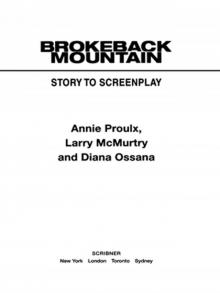 Brokeback Mountain
Brokeback Mountain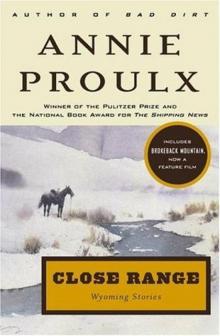 Close Range
Close Range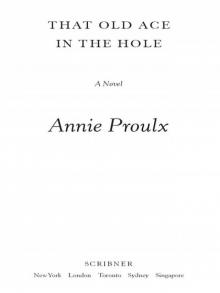 That Old Ace in the Hole
That Old Ace in the Hole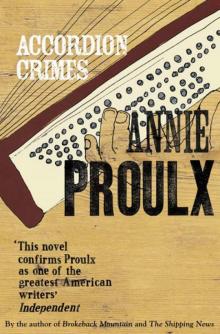 Accordion Crimes
Accordion Crimes Heart Songs and Other Stories
Heart Songs and Other Stories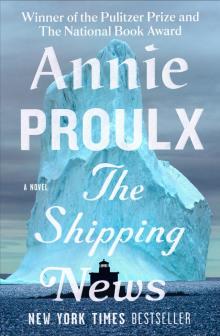 The Shipping News
The Shipping News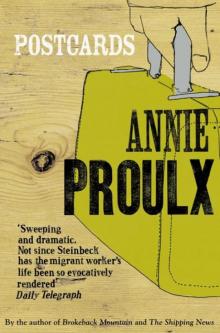 Postcards
Postcards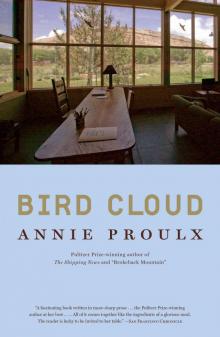 Bird Cloud
Bird Cloud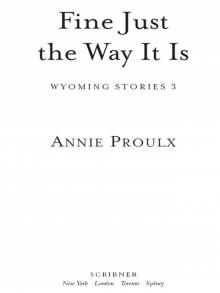 Fine Just the Way It Is
Fine Just the Way It Is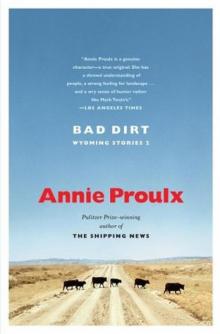 Bad Dirt
Bad Dirt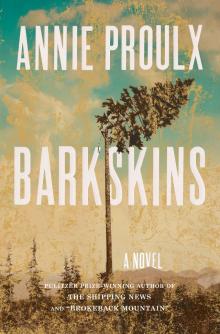 Barkskins
Barkskins BrokebackMountain
BrokebackMountain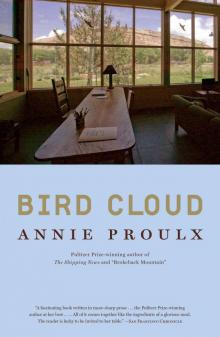 Bird Cloud: A Memoir of Place
Bird Cloud: A Memoir of Place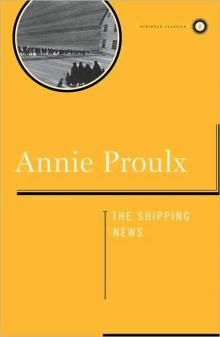 Shipping News_A Novel
Shipping News_A Novel